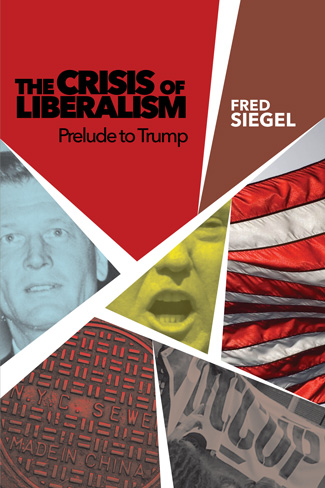The art of scandalizing is inexhaustible. In Kant’s Anthropology, there are a few remarks familiar to anyone who has studied Kant. According to the standards of the spirit our time, one could characterize those as racist. That media attention can be sparked from this today is known since the leveling of similar accusations at Shakespeare and Mark Twain. Hegel praised war, Nietzsche proclaimed the necessity of slavery, the hypersensitive Walter Benjamin made use of the word “gypsy.” One could endlessly extend the proscription list of scandalous thinkers. For the block warden of thought, there is really not a single great mind before 1968 with whom some racist, militaristic, or misogynistic remark could not be substantiated.
|
Now available for pre-order from Telos Press Publishing: The Crisis of Liberalism: Prelude to Trump, by Fred Siegel. Pre-order the paperback edition today in our online store and save 30% off the list price. Offer expires 9/30/20. Also available now in Kindle ebook format. Release dates: October 1, 2020 (paperback), September 15, 2020 (ebook).
by Fred Siegel In The Crisis of Liberalism: Prelude to Trump, Fred Siegel leverages New York City to uncover the key political conflicts and social contradictions in American liberalism over the last century. This wide-ranging collection of essays critically recounts how passionate intellectual debates over how to realize “the good life” in the modern city emerged from the writings of early progressive “thought leaders,” who envisioned a new educated elite capable of enlightened democratic governance. The flaws in this approach, as Siegel shows, expressed themselves most floridly in John Lindsay’s New York, whose flashy limousine liberals were a preview of today’s politically correct gentry liberalism. Its cultural programs over the past half-century repeatedly failed the downtrodden underclass and alienated middle-class New Yorkers trapped in economic stagnation. By neglecting voters’ real concerns over illegal immigration and China’s emerging threats, globalist technocratic liberals ultimately set the stage for Donald Trump’s angry nationalist demand to put “America First.” The following interview was conducted by Moritz Schwarz and appeared in Junge Freiheit, on August 14, 2020. Published with permission. Translated by Russell A. Berman, who has written a separate note here. Dr. Maaßen, the Mayor of Tübingen, Boris Palmer, has warned against a “world of prohibitions” in Germany, in which “moral condemnation” could follow the smallest mistake. This would “destroy liberal democracy.” Is he right? Hans-Georg Maaßen: I am a jurist, out of passion, and that’s why I am frightened to have to agree with him in part. I am deeply concerned that our legal state—the rule of law—is being more and more undermined by the rule of morality. Bärbel Bohley’s disappointed phrase is well known: “We wanted justice, but all we got is the rule of law.” Isn’t morality the better and ethically higher good? Maaßen: No. It is true that the law only provides a moral minimum. Yet that is precisely the precondition of freedom. The following interview was conducted by Alexander Wendt on July 5, 2020, and originally appeared in German on Tichys Einblick on July 13, 2020. Translated by Russell A. Berman. Alexander Wendt: Professor Bolz, the costs of the coronavirus pandemic are still unknown, but they will surely leave deep scars for years to come. Will our society return from post-materialism to a society with hard materialist concerns with numbers and balance sheets? Norbert Bolz: Even before the coronavirus crisis, I had doubts as to whether the notion of a post-material society made much sense. To my mind, the “post-material” term only makes real sense as a description of digitalization and the rise of information technology. But the superstructure that is usually meant by “post-material” seems to me to be mainly a substitute for religion, and it never had the real significance for society that many ascribe to it. |
||||
|
Telos Press Publishing · PO Box 811 · Candor, NY 13743 · Phone: 212-228-6479 Privacy Policy · Data Protection Copyright © 2025 Telos Press Publishing · All Rights Reserved |
||||



